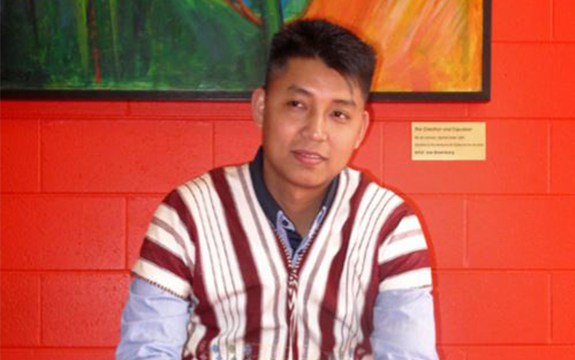Starting again in Australia

In Summary
- Written by Serena Seah, Susan Powell and Susan Bradley, Swinburne University of Technology. This edited article is republished from Finding Our Place.
Ta Hay Htoo’s family are Karen people, belonging to the persecuted Christian ethnic minority whose home is Karen State in the south-east of Myanmar (known as Burma until independence from Britain in 1948).
Since independence, the Karens have been threatened with the loss of their identity and autonomy for protesting against the ruling political regime. The protests of these groups are met with armed conflict, discrimination and violation of human rights.
As a child, Ta Hay, his parents and his two younger brothers frequently had to flee the fighting and hide out in the nearby jungle.
Escape to Thailand
When he was eleven, Ta Hay and his family made the highly dangerous crossing of the Salween River, which runs along the Burmese border with Thailand, to take refuge in Mae Ra Moe camp on the Thai side - one of nine such camps in the region set up for displaced Karen people.
The displaced Karens are not permitted to go outside the perimeter of their particular camp, to earn a living or to learn Thai. In order to re-inforce the feeling of impermanence, they are allowed to build only bamboo houses with roofs of thatched leaves.
Young residents receive an education to Year 10 level, after which there is no provision for them. Adult residents spend most of their time growing food and tending animals. Basic supplies such as oil and rice and some other goods are provided by the UNHCR (United Nations High Commissioner for Refugees).
After their arrival, Ta Hay and his brothers were finally able to go to school, although to Ta Hay’s great disappointment he had to leave at the end of Grade 6 due to his deteriorating vision - the result of earlier contracting measles. His vision has continued to worsen over the years. Today, Ta Hay is deemed to be legally blind; in due course, he will become totally blind.
In 2012, the extended family (Ta Hay’s parents, his wife and child and his brothers) made the momentous decision to start again elsewhere, in the West. Through the UNHCR one brother was accepted into the United States, while the rest of the group were told they were going to Australia. The Htoos could not possibly have conceived how different every aspect of their new home would be from anything they had previously known.
Another universe
The new experiences began the moment the family boarded the plane in Bangkok in late 2012 for the fight to Melbourne. ‘From the beginning,’ says Ta Hay, ‘it was as though I had been re-born… It was another universe. There was so much to learn.’
Re-settlement presented great challenges for them all, and especially so for someone in his situation. Several years on, though, it is clear that everyone in the household is making a successful transition. Learning English – which none of the newcomers knew before – has been fundamental to this.
‘Before I came to Australia I thought my life here would be the same as it was in the camp,’ says Ta Hay. Given his experiences there, he assumed that he would not have the opportunity to resume his education…nor could he have dreamt of a future in which he might be employed.
He was accepted into Migrant English classes at beginner level at Swinburne, where supportive teachers perceived his potential and helped him. From the start he was provided with classroom integration aides who worked closely with him and continued to do so until he had completed Level 3. Workers from organisations which assist new migrants, especially refugees, and a range of other mentors have all played their part.
Available assistance
At the commencement of his studies, when confronted with a computer he did not know how to use, Ta Hay devised his own creative code for typing. For reading he used a magnifying glass, which gave him bad headaches and made him dizzy. But such was his determination that he persevered with these means of learning until Swinburne purchased JAWS (a software which turns type into speech) for his use on a class computer, and for which he received training from Vision Australia.
His progress accelerated when grants from a community service organisation and a Swinburne Achievement Award enabled him to purchase JAWS for home use.
Thanks to a further grant from a different community service club, Ta Hay was able to purchase an iPhone and to receive training in usage from Vision Australia. The device has apps that enable him to navigate and negotiate much in everyday life.
The degree of human and high tech assistance he has received would go nowhere without Ta Hay’s own motivation, hard work and ambition. His initial goal was to learn to communicate effectively in written and spoken forms of English and this he has achieved.
Currently he is working on trial at a nursery that provides experience to people with disabilities. He hopes a permanent part-time job will come out of this. A dream is to become an interpreter and to this end he keeps up his English via the internet and has plans to return to Swinburne for further English studies.
This story is available in full in the publication ‘Finding our Place’ by Serena Seah, Susan Powell and Susan Bradley and is available through Swinburne Commons.

